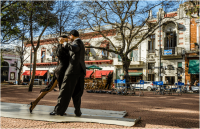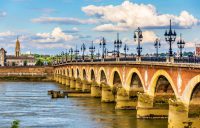O’Higgins, Mackenna, Lynch: these are just a few examples of significant figures in the history of a particular nation. However, if you immediately thought Irish history, you’d be mistaken – these are the names of important figures in Chilean history. In fact, one of them, Bernardo O’Higgins, is considered the father of modern Chile. Today, there’s estimated to be 120,000 Chileans of Irish descent – so you might come across some Irish Chilean names during your trip. So how did so many Irish people come to be in Chile? In this article, we give a crash course on the history of the Irish in Chile, and share some facts about Chile’s most notable Irishmen.
How the Irish in arrived in Chile
In the 18th and early 19th century, lots of Europeans were migrating to South America in the wake of colonization. Many of these migrants were seeking a better life away from oppression in Europe. One of the most important and influential groups were Irish Catholics, who were escaping persecution by the Protestant government in the Kingdom of Great Britain. These Irish immigrants form a particularly important part of Patagonian culture, as many of them became sheep farmers in the southern region. Therefore, many Patagonians can trace back their Irish heritage through their ‘Hispanicized’ Irish Chilean names. These migrants are known as “The Wild Geese”, which refers to the large number of Irish people leaving their homeland between the 16th–18th centuries to escape religious persecution.
Irish Chilean names from history
Bernardo O’Higgins (1778–1842)
So great was the cultural influence of the Irish in Chile that a man of Irish decent became the leader of the Chilean independence movement. Bernardo O’Higgins was the son of Irish-Spanish nobleman Ambrosio O’Higgins, who was Viceroy of Peru (which at the time, included Chile). After studying in London, O’Higgins was inspired by American ideas about independence and national pride. As a result, O’Higgins became an important leader during the Chilean War of Independence (1810–1826). Today, O’Higgins is known as the “Father of Chile” as he was the first Supreme Director of a completely independent nation.
Juan Mackenna (1771–1814)
Another of history’s most prominent Chilean names is Mackenna. Juan Mackenna was another important military leader of the Chilean independence movement. Born John Mackenna in County Monaghan, Ireland, John studied in Spain until leaving for Chile in 1796. There, he would meet Ambrosio O’Higgins and later become a firm ally of his son, Bernardo O’Higgins. After the declaration of independence, he was charged with planning and equipping the new Chilean Army.
Patricio Aylwin (1918–2016)
Sadly, Chile’s modern political history is full of tragedy. In 1973, Chile’s socialist president Salvador Allende was overthrown in a coup d’etat by Augusto Pinochet. What followed was a violent military junta that saw thousands of Chileans tortured, murdered, and exiled. However, there was light at the end of the tunnel; in 1988, General Pinochet stepped down after agreeing to hold elections. In 1990, Patricio Aylwin took office as a democratically elected President of Chile. Although the army retained significant power in government, Aylwin worked hard to expose the previous government’s human rights violations.
No comments yet
There are no comments on this post yet.






Leave a comment